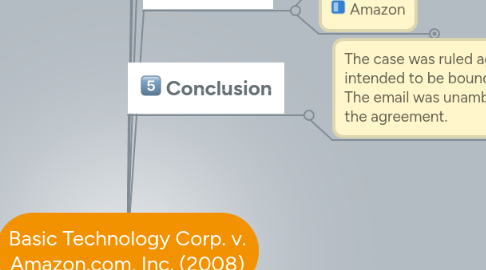
1. Module 2
2. Facts
2.1. Basis created software and provided technical services for Amazon's Japanese language website
2.2. Basis had a contract with Amazon that allowed for separately negotiated contracts for additional services
2.3. In 1999 Amazon entered into stock purchase agreements with Basis
2.4. Amazon objected to certain actions related to certain securities that Basis sold
2.5. Basis sued Amazon for claims involving those securities and for failing to pay for services Basis offered that were not covered by the original contract
2.5.1. Basis counsel sent an email with the essential terms of settlement to be signed by both parties.
2.5.2. Amazon counsel replied "correct" to the email
2.5.3. Later the Amazon counsel sent another email with additions to the initial draft.
2.5.3.1. Basis objected and moved to enforce the agreement.
3. Analysis
3.1. Basis
3.1.1. Basis counsel sent an email outlining the essential terms of the agreement.
3.1.2. Gave Amazon counsel opportunity to object but Amazon counsel did not.
3.1.3. Basis believed that the email contract was clear and Amazon counsel agreed to it when s/he replied "correct". This made the contract enforceable when Amazon's counsel changed mind.
3.2. Amazon
3.2.1. Amazon counsel objected that the email agreement was not sufficient and erroneously responded to the email. That Amazon had not intended to be bound by the email agreement
3.2.2. Amazon did not deny receiving an email with the terms but contended that never intended to be bound by the email terms without reviewing them.
4. Regulation
4.1. Interpretation of ambiguous contract and are terms of a contract in an email sufficient?
4.1.1. The Plaintiff must show that the terms of the contract were spelled out clearly and the offered had opportunity to object
